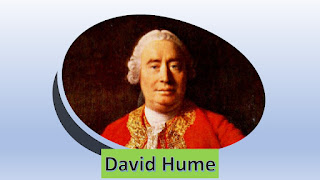 |
| David Hume: Skeptical Empiricism vs Supernaturalism |
“A wise man, therefore, proportions his belief to the evidence.”
—David Hume (Of Miracles)
I will publish Enlightenment philosopher David Hume's essay Of Miracles on this blog as a series of three web pages. This first web page contains an introduction to Hume's essay; the second page will contain Part One of the essay; and the third page will contain Part Two. Hume's essay evaluates whether supernatural revelation and religious faith are legitimate means of acquiring knowledge of the world.
Although
Of Miracles was among David Hume’s earliest philosophical writings, he
did not publish it until much later, when he included it as Section X of his longer
work, An Enquiry Concerning Human Understanding. Of Miracles is
probably the most widely read and quoted portion of that larger work.
As
a stand-alone essay, Of Miracles is a concise introduction to Hume’s philosophy
of skeptical empiricism. It also remains a compelling critique of religious
faith and supernaturalism, and it is as important and instructive today as it
was when it was published 270 years ago.
This
essay was written while Hume was visiting a Jesuit college in France. It was
apparently an impassioned response to a priest who had told Hume about a
miracle that had purportedly occurred at the college.
In
the beginning of the essay, Hume examines the methods we use to evaluate claims
to Truth. Hume believed that we test new information against our own experience
of the world, and ultimately, our experiences are derived from sense
impressions. Moreover, he held that we recognize patterns of conjoined
experiences, where one event seems to follow another so consistently and
reliably, that we infer beliefs about the world and make predictions based on
those beliefs. These predictions can, in turn, be tested, and if they are found
to be accurate, then we accord a greater degree of certainty to those beliefs.
What
Hume was describing was, in essence, the modern scientific method. Since Hume’s
time, science has incredibly improved our understanding of the world and our
ability to predict and utilize natural phenomena. All of these advancements
were made possible by the scientific method, which involves rigorously testing
hypothetical claims and predictions based on those claims, and then, to use
Hume’s words, proportioning our beliefs to the evidence. Modern science has
largely validated Hume’s empiricism.
Against
the method of empirical skepticism, Hume contrasts the claims of
supernaturalism. Here, he is not primarily concerned with the substance of
supernatural claims (i.e., what supernaturalists believe to be true),
but rather with the method used by religious believers to validate those claims
(i.e., why supernaturalists believe what they do.
One
is reminded of the trite saying, popular in evangelical circles, that “God said
it; I believe it; that settles it.”
For
Hume, that did not settle it. How do we know God really said it? Not by our own
experience. None of us were directly involved with the production of the Bible
as we know it (the same would be true with the world’s other theistic texts). We
are basing our belief about what God said on the claims of other people whom
we’ve never met, who lived millennia ago, who did not have the benefit of
modern knowledge about the world, and who inhabited a cultural and
technological landscape that would be utterly foreign to us. Considering how we
“know” the things that we think we know, just how much weight should we accord
the claims of these ancient witnesses?
As
a side note, the question is actually more thorny for religious believers than
that. As New Testament scholar Bart
Ehrman has pointed out in best-selling books such as Misquoting
Jesus and Jesus
Before the Gospels, we really can’t be sure what the
actual “eyewitnesses” said or believed, because most of the Bible wasn’t
written by people who even claimed to be eyewitnesses, but rather by people
living decades or centuries after the fact.
As
Hume famously wrote, “A wise man, therefore, proportions his belief to the
evidence.” To assess a person’s claim that a miracle has occurred, we must
first determine the relative probabilities of two things: (1) that the regular
patterns of nature have been momentarily disrupted, and (2) that the person
making the claim is either mistaken or simply lying. For Hume, the odds are
always stronger that the person who claims a miracle has happened is either
mistaken or simply lying.
One important caveat, Hume is not saying, as some critics have tried to make him out to say, that miracles are impossible or that the “laws of nature” are immutable and certain. Rather, Hume is simply saying that it is impossible for us to know whether a miracle has happened, and that in the absence of such knowledge, we must judge the probability of a miracle’s occurrence on the information available to us. For Hume, that information always favors the judgment that a miracle is unlikely to have occurred.
To read Part One of Hume's essay Of Miracles, click here: https://www.finding-meaning-in-life.com/p/david-hume-of-miracles-part-one.html
To read Part Two of Hume's essay Of Miracles, click here: https://www.finding-meaning-in-life.com/p/david-hume-of-miracles-part-two.html or you can return to the Finding Meaning in Life homepage here: https://www.finding-meaning-in-life.com/
No comments:
Post a Comment
Thank you for taking the time to read and comment on this blog!
Best regards,
Daniel D